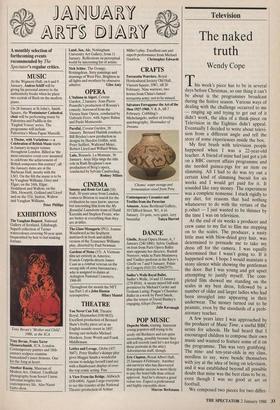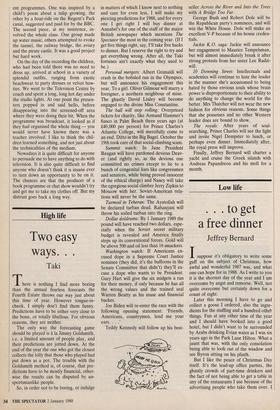Television
The naked truth
Wendy Cope
This week's piece has to be in several days before Christmas, so one thing it can't be about is the programmes broadcast during the festive season. Various ways of dealing with the challenge occurred to me — ringing up and trying to get out of it didn't work, the idea of a think-piece on Television in the Eighties didn't appeal. Eventually I decided to write about televi- sion from a different angle and tell the story of some experiences inside the box.
My first brush with television people happened when I was a 22-year-old teacher. A friend of mine had just got a job on a BBC current affairs programme and she needed guinea-pigs for an item on slimming. All I had to do was try out a certain kind of slimming biscuit for six weeks and I would get paid for it. It sounded like easy money. The experiment was a complete nonsense. I stuck rigidly to my diet, for reasons that had nothing whatsoever to do with the virtues of the product — I just wanted to be thinner by the time I was on television.
At the end of six weeks a producer and crew came to my flat to film me stepping on to the scales. The producer, a nasty little man with blow-dried grey hair, was determined to persuade me to take my dress off for the camera. I was equally determined that I wasn't going to. If it happened now, I hope I would maintain a stony silence while showing the gentleman the door. But I was young and got upset attempting to justify myself. The com- pleted film showed me standing on the scales in my best dress, followed by a number of older and larger ladies who had been inveigled into appearing in their underwear. The money turned out to be peanuts, even by the standards of a prob- ationary teacher.
A few years later I was approached by the producer of Music Time, a useful BBC series for schools. He had heard that I encouraged children to compose their own music and wanted to feature some of it on the programme. This was very gratifying. The nine- and ten-year-olds in my class, needless to say, were beside themselves with joy at the idea of being on television, and it was established beyond all possible doubt that mine was the best class to be in, even though I was no good at art or football.
We composed two pieces for two differ- ent programmes. One was inspired by a child's poem about a tulip growing, the other by a boat-ride on the Regent's Park canal, suggested and paid for by the BBC. The second piece, at my insistence, in- volved the whole class. One group made up water music, others attempted to evoke the tunnel, the railway bridge, the aviary and the pirate castle. It was a good project but hard work.
On the day of the recording the children, who had been told there was no need to dress up, arrived at school in a variety of splendid outfits, ranging from exotic beachwear to party dresses or velvet bow- ties. We went to the Television Centre by coach and spent a long, long hot day under the studio lights. At one point the presen- ters popped in and said hello, before disappearing into the screened-off area where they were doing their bit. When the programme was broadcast, it looked as if they had organised the whole thing — you would never have known there was a teacher involved. I like to think the chil- dren learned something, and not just about the technicalities of the medium.
Nowadays it is quite difficult for anyone to persuade me to have anything to do with television. It is also quite difficult to find anyone who doesn't think it is insane ever to turn down an opportunity to be on it. The chances are that the producer of a book programme or chat show wouldn't try and get me to take my clothes off. But my distrust goes back a long way.











































 Previous page
Previous page